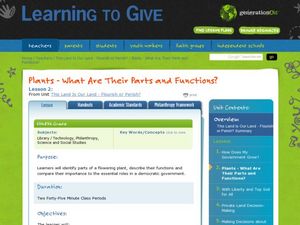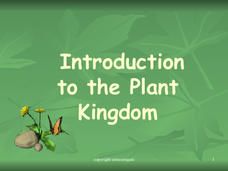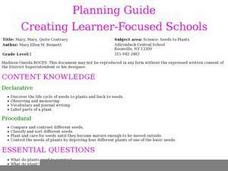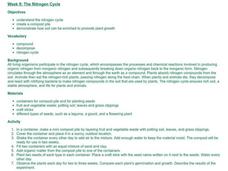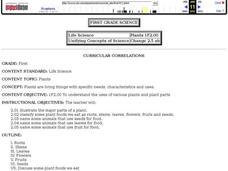Curated OER
The Life Cycle of a Flowering Plant
In this flowering plant worksheet, students will review vocabulary words associated with the life cycle of flowering plants. This worksheet has 7 matching and 3 short answer questions.
Curated OER
"Five Little Seeds"
Fourth graders complete various activities related to the plant life cycle. They read the book "The Tiny Seed," read and discuss the poem "Five Little Seeds," complete a "Plantenstein Mystery" and other online activities, write and...
Chicago Botanic Garden
Preparing for Project BudBurst
Male deer growing antlers to begin the breeding season is an example of a phenological event. First in a four-part series is an activity requiring individuals to collect phenological data on their campus. Classes discuss phenology, the...
Curated OER
What Happens to a Seed?
In this creative instructional activity on seeds, 1st graders listen as the book The Tiny Seed by Eric Carle is read to them about the life of a seed. Students then draw a picture to show the life cycle of a seed in each season.
Curated OER
Plant Power
Here is an opportunity for your first graders to take a close look at plants: what they need to survive, how they grow, and the names of each plant part. The book, Corduroy's Garden is used to open the lesson. Then, youngsters utilize...
PBS
Reading Adventure Pack: Bees
A Reading Adventure pack explores the busy life of bees. After reading a fiction and nonfiction text, scholars complete three hands-on activities. Participants invent a robot that can do the work of bees, cheers to hardworking bees with...
Curated OER
Flutterings and Flowers
Fourth graders investigate the significance of natural resources and the habitats of butterflies. They create a list of their own favorite foods, then watch a video about habitats. Students identify things in the video that animals and...
Curated OER
Raising Plants
Students investigate the life cycle of plants by growing their own in class. In this botany lesson, students practice using plant vocabulary while they grow their own Wisconsin Fast Plants. Students collaboratively build a light box...
Curated OER
Plants- What Are Their Parts and Functions?
Students learn about plants. In this plant function activity, students label the parts of a plant and their functions. Students work in small groups to create three simile statements to relate to the function of essential plant parts....
Biology Junction
Introduction to the Plant Kingdom
Plants provide humans with food, shelter, and medications. Scholars gain a better appreciation for plants after learning their functions, divisions, and early ancestors. Each sub-topic includes slides highlighting vocabulary and...
Curated OER
Life cycles
Students identify and explain the parts of a flower and their role in the life cycle of flowering plants, including pollination, seed dispersal, and germination. Students recap the following information: that plants need light, warmth,...
Curated OER
Science: Seeds to Plants
First graders compare and contrast different seeds before planting them. They assess the basic needs to plants and conduct experiments of deprivation of those needs. They write stories and draw pictures of plants which are bound into a...
Alabama Learning Exchange
Plants, Soil and Nutrients
Young scholars conduct an experiment. They review how to use the scientific method to conduct an experiment with white carnations and food coloring. They create a hypothesis and test it to better understand how plants get nutrients,...
Biology Junction
Introduction to Plants
In this biology lesson, students identify the different types and parts of the plant. They complete a crossword puzzle with 37 questions about plants.
Curated OER
Birth, Growth, And Development
Students understand that all living things have a life cycle that includes being born, developing into an adult, reproducing, and eventually dying.
Curated OER
Life Cycle of Brassica Plants: Planting Seeds
Students explore botany by participating in a calendar class activity. In this plant observation instructional activity, students examine a diagram of a Brassica plant and identify its anatomy before planting their own seeds and viewing...
Curated OER
The Nitrogen Cycle
Young scholars design and create a compost pile in order to study the Nitrogen Cycle. They then use the scientific method to determine if plants grow better when they add organic matter from their compost pile to the plant's soil.
Curated OER
Plants
Pupils illustrate the major parts of a plant, classify some plant foods we eat as roots, stems, leaves, flowers, fruits and seeds. They also name some animals that use seeds, leaves, and fruit for food.
Curated OER
Bringing Up Birdy
Students explore biology by creating diagrams of animal life cycles. In this baby bird activity, students view video clips of birds being born from incubation to flying on their own. Students utilize the Internet to research birds and...
Curated OER
Structure and Function of Bulbs, Corms and Rhizomes
Students explore the concept of philanthropy and why people give. They investigate the importance of the tulip to Holland and the tradition of giving flowers away. They begin to explore the life cycle of tulips and dissect a bulb to...
Curated OER
Seed Structure and Seed Dispersal
Third graders plant seeds. In this seed structure instructional activity, 3rd graders identify parts of a seed and plant a lima bean seed. Students discuss and reflect on the process in their journals.
Curated OER
Sun Seeking Plants
Students investigate the story "The Tiny Seed" by Eric Carle. This story is used to introduce the children to the concept that seeds change and grow into plants when conditions in the environment including temperature, light, water and...
Curated OER
Sunflowers (Grades 3-8)
Students examine sunflowers and discuss the importance of sunflower cooking oil and seeds. They view pictures, read books, sing sunflower songs, and grow flowers from sunflower seeds.
Curated OER
Plants -- What Are Their Parts and Functions?
Students identify the parts of a flowering plant and their functions. They describe its life cycle as well. They compare the parts of the plant to the roles that are needed in a democracy.










